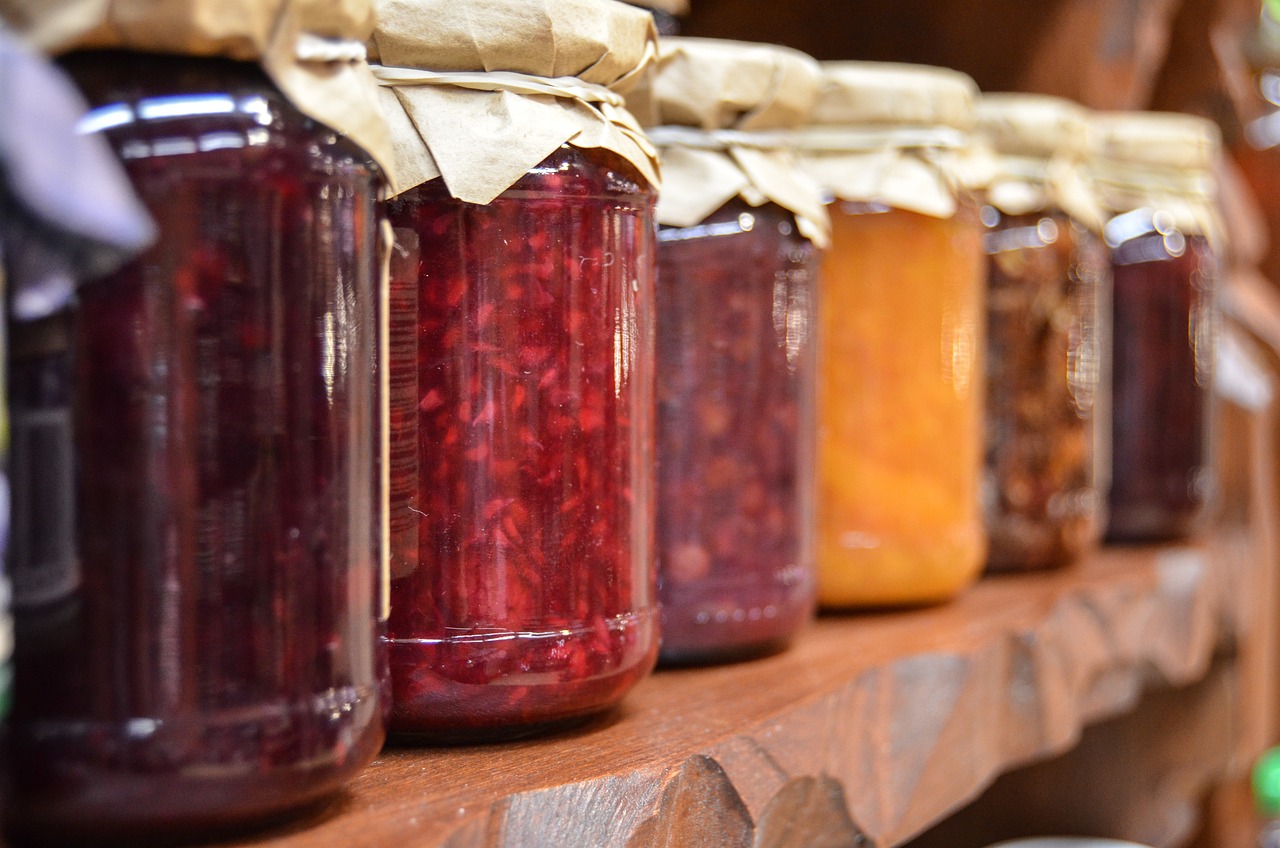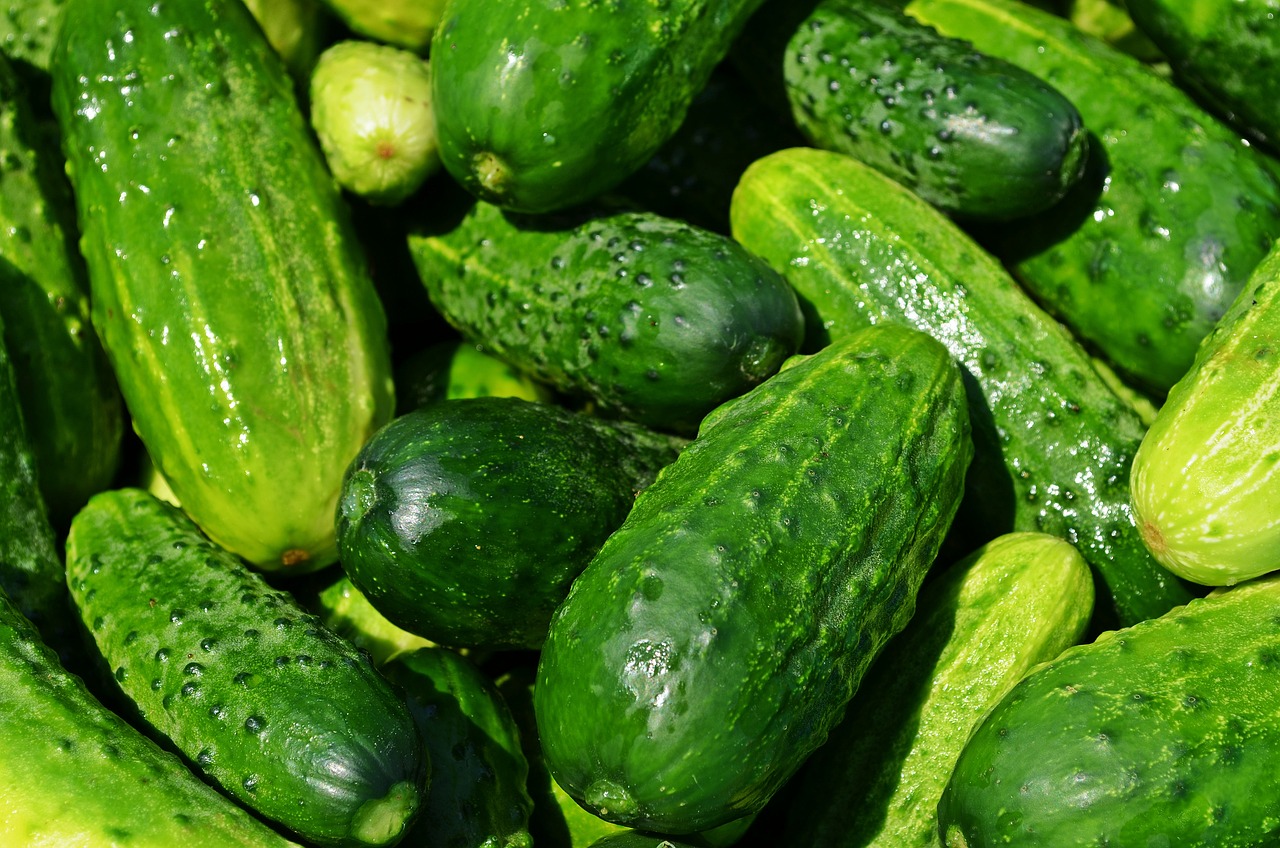The Benefits of Eating Locally Sourced Food
Eating locally sourced food is not just a trend; it's a lifestyle choice that can significantly enhance your health, support your community, and protect the environment. Imagine biting into a juicy, sun-ripened tomato that was picked just hours ago, bursting with flavor and nutrients. This experience is what local food brings to the table—literally! By consuming food that is grown nearby, you get access to fresher, more nutritious options that can elevate your diet. But the benefits don’t stop at your plate. They ripple through our communities, economies, and ecosystems. In this article, we’ll explore the myriad advantages of choosing local foods, from health benefits to environmental impacts and the positive effects on local economies.
One of the most compelling reasons to eat locally sourced food is the health benefits it provides. Local produce is often harvested at its peak ripeness, meaning it retains more nutrients compared to items that have traveled long distances. When you bite into locally grown fruits and vegetables, you're not just enjoying better taste; you're also fueling your body with essential vitamins and minerals. This can lead to improved overall health, helping you maintain a balanced diet.
Furthermore, many local farms practice organic farming methods, which means you’re less likely to consume harmful pesticides and chemicals. Eating local can also encourage you to try new foods that are in season, which can add variety to your diet and expose you to different nutrients. Have you ever tasted a freshly picked strawberry in June or a crisp apple in the fall? These seasonal delights remind us that food is not just about sustenance; it’s about experiencing flavors that are unique to each time of year.
Choosing locally sourced food is a powerful way to reduce your carbon footprint. Transportation of food contributes significantly to greenhouse gas emissions, as food often travels thousands of miles before reaching your plate. By opting for local produce, you help minimize these emissions, making a positive impact on our planet. Think about it: when you buy a tomato from a local farmer's market, it may have traveled only a few miles, compared to a tomato that has been shipped across the country or even imported from another country. This simple choice can lead to a significant reduction in transportation emissions.
Transportation is a major contributor to climate change, and by choosing local food, you can help combat this issue. The shorter distance food has to travel means less fuel is used, which directly translates to fewer emissions. For instance, consider the average distance food travels in the United States—over 1,500 miles! By supporting local agriculture, you’re not just making a meal choice; you’re making a choice for the planet.
Local farms often utilize diverse farming practices that promote biodiversity. When you purchase locally sourced food, you’re supporting a variety of crops and livestock breeds, which can help preserve various plant and animal species. This is crucial, as biodiversity plays a key role in ecosystem stability. By eating locally, you contribute to a healthier environment that supports not just human life but all forms of life.
Water is a precious resource, and local farming practices can lead to better water management. Many local farmers are committed to sustainable practices that conserve water and protect water quality. For example, they might use drip irrigation systems that minimize waste or implement crop rotation to maintain soil health. By choosing local foods, you’re supporting these environmentally friendly practices and contributing to sustainable water usage.
Eating locally sourced food encourages seasonal eating habits, which can lead to a more varied and nutritious diet. Seasonal eating means you’re consuming foods at their peak freshness and flavor, which enhances your culinary experience. Plus, it introduces you to new ingredients that you might not typically consider. When you align your diet with what’s in season, you not only enjoy a richer variety of flavors but also support local farmers who depend on seasonal cycles for their livelihoods.
Purchasing locally sourced food is a powerful way to support local farmers and businesses. When you buy local, you’re investing in your community and helping to boost the local economy. This not only allows farmers to thrive but also creates jobs in farming, distribution, and retail. Local food markets thrive on community support, and every dollar spent locally helps to strengthen the economic fabric of your area.
Local food markets create jobs in various sectors, from farming to distribution and retail. When you support local food systems, you’re helping to create employment opportunities right in your community. This is especially important in rural areas where farming is often the backbone of the local economy. By choosing to buy local, you’re not just filling your pantry; you’re helping to sustain livelihoods and foster economic growth.
Eating locally fosters a sense of community and connection among consumers and producers. When you shop at a farmer's market or join a local food co-op, you’re not just buying food; you’re engaging with your community. You get to know the people who grow your food, learn about their farming practices, and even share recipes and cooking tips. This connection builds relationships and strengthens community bonds, making your food choices a way to engage socially.
- What is locally sourced food? Locally sourced food refers to food that is grown or produced within a specific distance from where it is sold, typically within 100 miles.
- Why is eating local better for the environment? Eating local reduces transportation emissions, supports biodiversity, and promotes sustainable farming practices that conserve resources.
- How can I find local food sources? You can find local food sources by visiting farmer's markets, joining local food co-ops, or checking online directories for local farms.

Health Benefits
This article explores the numerous advantages of consuming locally sourced food, including health benefits, environmental impact, and support for local economies, ultimately promoting a sustainable lifestyle.
When it comes to food, freshness is key, and that’s where locally sourced food truly shines. Imagine biting into a ripe tomato that was picked just hours ago, bursting with flavor and nutrients. Eating locally sourced food often means you’re consuming produce that hasn’t traveled thousands of miles, which translates to higher nutritional value. Fresh fruits and vegetables are packed with vitamins and minerals that can degrade over time during long transportation. This means that by choosing local, you're not just supporting your community, but also giving your body the best possible fuel.
Local foods are often grown in season, which means they’re harvested at their peak ripeness. Think of it this way: eating in season is like tuning into nature’s playlist. You get to enjoy the best flavors and nutrients that each season has to offer. For example, in the summer, you might indulge in juicy berries and vibrant zucchinis, while fall brings hearty squash and crisp apples. This seasonal variety not only keeps meals exciting but also ensures that your diet is more balanced and diverse.
Moreover, consuming locally sourced food can lead to a more sustainable lifestyle. Local farms often prioritize organic and sustainable farming practices, which means you’re likely eating food that is free from harmful pesticides and chemicals. This is particularly important for your health, as it reduces your exposure to substances that can have negative long-term effects. Additionally, many local farmers are committed to ethical farming practices, ensuring that animals are treated humanely and that their farming methods are environmentally friendly.
To illustrate the health benefits of eating locally sourced foods, consider the following table that compares the nutritional content of locally sourced versus store-bought produce:
| Produce Item | Nutritional Content (per 100g) | Locally Sourced | Store-Bought |
|---|---|---|---|
| Tomato | Vitamin C | 14 mg | 10 mg |
| Spinach | Iron | 2.7 mg | 1.0 mg |
| Strawberries | Vitamin C | 58 mg | 48 mg |
As you can see, locally sourced foods often have higher nutritional content compared to their store-bought counterparts. This is a compelling reason to make the switch to local produce, not only for your personal health but also for the health of your community and environment.
In summary, the health benefits of eating locally sourced food are significant. From fresher, more nutritious produce to supporting sustainable farming practices, choosing local is a win-win for your health and the planet. So, the next time you’re at the grocery store or a farmer’s market, consider the impact of your choices. Your body—and your community—will thank you!
- What is locally sourced food? Locally sourced food refers to food that is grown and harvested within a certain distance from where it is sold, typically within 100 miles.
- How can I find locally sourced food? You can find locally sourced food at farmer's markets, local co-ops, or grocery stores that prioritize local produce.
- Are there any environmental benefits to eating locally sourced food? Yes, eating locally sourced food reduces transportation emissions and supports sustainable farming practices.
- Can eating locally improve my health? Absolutely! Local foods are often fresher and more nutritious than those that have traveled long distances.

Environmental Impact
When we talk about the of our food choices, it’s essential to recognize that every bite we take has a ripple effect on the planet. Eating locally sourced food is not just a trend; it’s a powerful way to contribute to a healthier environment. One of the most significant advantages of consuming local produce is the reduction in transportation distances. When food travels shorter distances, it means less fuel consumption and fewer emissions of greenhouse gases. In fact, studies have shown that food transported over long distances can contribute up to 11 times more carbon emissions compared to local produce. Think about it this way: every time you choose a local apple over one shipped from thousands of miles away, you’re not just supporting a farmer; you’re also taking a stand against climate change.
Moreover, local farms often embrace sustainable farming practices that promote biodiversity. Unlike large-scale agricultural operations that tend to focus on monoculture, local farmers frequently grow a variety of crops, which helps to maintain a healthy ecosystem. This diversity is crucial for preserving various plant and animal species, ensuring that our food system remains resilient against pests and diseases. By choosing local, you’re not just feeding yourself; you’re also nurturing the planet’s biodiversity.
Another aspect to consider is water conservation. Local farming practices tend to be more attuned to the specific environmental conditions of their area. This localized approach often results in better water management techniques, which can significantly reduce water waste. For instance, many local farms utilize drip irrigation systems that deliver water directly to the plant roots, minimizing evaporation and runoff. By supporting these farms, you’re playing a part in promoting sustainable water usage, which is increasingly vital in our changing climate.
As we dive deeper into the environmental impact, it’s crucial to highlight the importance of reduced transportation emissions. When we purchase food that has traveled thousands of miles, we unknowingly add to the carbon footprint associated with our meals. Transportation of food, especially by trucks and planes, contributes significantly to greenhouse gas emissions. By opting for local produce, we can help mitigate these harmful effects. Consider this: a simple change in your shopping habits can lead to a substantial decrease in the amount of carbon dioxide released into the atmosphere.
Eating locally isn’t just about reducing emissions; it’s also about supporting agricultural practices that foster a rich variety of life. Local farms often adopt agroecological methods that enhance biodiversity. This means they grow multiple crops, which not only supports wildlife but also improves soil health. When we buy from these farms, we are endorsing practices that help maintain the delicate balance of our ecosystems.
Water is a precious resource, and local farms often implement practices that prioritize its conservation. By being more aware of their local environment, farmers can adopt innovative techniques that minimize water usage. For example, many local farms practice rainwater harvesting and use organic mulch to retain soil moisture. This not only helps in conserving water but also promotes healthier crops. When you choose local, you are supporting these sustainable practices that ultimately benefit our planet.

Reduced Transportation Emissions
When we think about the food on our plates, we often overlook the journey it took to get there. The truth is, the transportation of food is a major contributor to greenhouse gas emissions. By choosing to eat locally sourced food, we can significantly reduce these emissions. Imagine the difference it makes when your tomatoes travel just a few miles instead of thousands! Not only does this cut down on the carbon footprint, but it also ensures that the food is fresher and more flavorful.
Transportation emissions come from various sources, including trucks, planes, and ships. Each mile that food travels adds to its environmental impact. Here’s a quick look at how the distance food travels can affect its carbon footprint:
| Distance Traveled | Average Carbon Emissions (per kg of food) |
|---|---|
| Local (within 100 miles) | 0.5 kg CO2 |
| Regional (100-500 miles) | 1.5 kg CO2 |
| National (500-1500 miles) | 3.5 kg CO2 |
| International (over 1500 miles) | 5 kg CO2 |
As you can see from the table, the longer the distance, the higher the carbon emissions. By opting for local produce, we not only support our health but also contribute to a healthier planet. It’s a win-win situation! Furthermore, less transportation means less reliance on fossil fuels, which are rapidly depleting and harmful to our environment.
Additionally, supporting local farmers reduces the need for extensive packaging and refrigeration, which are often required for long-distance transportation. This means less waste and a more sustainable food system overall. So, the next time you're at the grocery store or a farmer's market, consider the impact of your food choices. By selecting local options, you’re making a conscious decision to help reduce transportation emissions and promote a more sustainable way of living.
In a world where climate change is a pressing issue, every little bit helps. Eating locally is like planting a seed of change in your community. It’s about creating a ripple effect that can lead to a greener future. So, let’s embrace the power of local food and take action towards reducing our carbon footprint, one meal at a time!
- What are the benefits of eating locally sourced food? Eating locally sourced food can improve your health, reduce environmental impact, and support local economies.
- How can I find locally sourced food? Look for farmer's markets, local co-ops, and community-supported agriculture (CSA) programs in your area.
- Does eating local really make a difference? Yes, it significantly reduces transportation emissions and supports sustainable practices.
- Are local foods always organic? Not necessarily, but many local farmers use sustainable practices that are better for the environment.

Supporting Biodiversity
When we talk about biodiversity, we're diving into the rich tapestry of life that surrounds us. Eating locally sourced food plays a crucial role in preserving this diversity. Local farms often engage in diverse farming practices that not only produce a variety of crops but also support a wide range of animal species. Imagine a vibrant ecosystem filled with different plants, insects, and animals, all thriving together. This is the beauty of biodiversity, and your food choices can help maintain it.
By choosing to buy from local farmers, you’re not just supporting their livelihoods; you’re also promoting agricultural practices that are often more sustainable than industrial farming methods. For instance, many local farms utilize crop rotation and intercropping, techniques that enhance soil health and reduce the need for chemical fertilizers. These methods encourage a natural balance of pests and pollinators, ensuring that various species can coexist harmoniously.
Moreover, local farms frequently grow heirloom varieties of fruits and vegetables that are not only delicious but also contribute to genetic diversity. These heirloom varieties are often more resilient to pests and diseases, which means they can thrive without the heavy use of pesticides. When you choose to eat locally, you are essentially casting a vote for these unique and resilient crops to continue flourishing.
In addition to the benefits for plants, supporting local agriculture can also have a positive impact on local wildlife. Farms that embrace biodiversity often create habitats for various species, from bees to birds. These creatures play vital roles in our ecosystem, such as pollination and pest control. By eating locally, you help sustain these habitats, ensuring that wildlife has a place to thrive.
So, how can you make a difference? Here are a few simple steps to consider:
- Visit local farmers' markets to discover a variety of produce.
- Join a community-supported agriculture (CSA) program for a regular supply of local foods.
- Educate yourself about local farms and their practices to make informed choices.
In conclusion, by choosing locally sourced food, you are not only benefiting your health and the environment but also playing a significant role in supporting biodiversity. Every meal becomes a chance to contribute to a more sustainable and vibrant ecosystem. So next time you’re at the grocery store or farmers' market, think about the impact of your choices and how they resonate through the web of life around us.
1. What is biodiversity?
Biodiversity refers to the variety of life in a particular habitat or ecosystem, including the different species of plants, animals, and microorganisms, as well as the genetic diversity within those species.
2. How does eating locally support biodiversity?
Eating locally supports biodiversity by promoting farming practices that are often more sustainable and diverse, which helps to preserve various plant and animal species in the ecosystem.
3. What are heirloom varieties?
Heirloom varieties are traditional plant varieties that have been passed down through generations. They are often more flavorful and resilient compared to commercially grown varieties.
4. How can I find local farms?
You can find local farms by visiting farmers' markets, searching online directories, or joining community-supported agriculture (CSA) programs in your area.
5. Why are local farms better for the environment?
Local farms typically have a smaller carbon footprint due to reduced transportation distances, and they often engage in sustainable farming practices that promote biodiversity and soil health.

Water Conservation
When we talk about , it’s hard to ignore the crucial role that locally sourced food plays in this vital area. Think about it: local farms often utilize practices that are not only beneficial to the crops but also to the environment. Unlike large-scale agriculture that may rely on extensive irrigation systems, local farmers tend to adopt methods that are more in tune with the natural landscape. This means they can often use rainwater harvesting and crop rotation to minimize water usage.
Moreover, local farmers are typically more aware of their immediate environment and the water resources available to them. They can monitor their water usage closely and adjust their practices accordingly. This localized approach not only conserves water but also promotes sustainable agriculture that can thrive without depleting precious resources. For instance, many local farms implement drip irrigation systems that deliver water directly to the roots of plants, significantly reducing waste compared to traditional methods.
But how does consuming local food translate into better water conservation for you as a consumer? When you choose to buy locally, you're essentially supporting farming practices that prioritize environmental stewardship. This creates a ripple effect, encouraging more farmers to adopt water-efficient techniques. It's like voting with your wallet; every dollar spent on local food is a vote for sustainable practices that benefit the entire community.
Additionally, by eating seasonally and locally, you help reduce the demand for out-of-season produce, which often requires more water-intensive farming methods. This not only conserves water but also helps maintain the health of local ecosystems. When farmers grow crops that are suited to the local climate and soil conditions, they naturally use less water, leading to a more sustainable food system.
In conclusion, the connection between locally sourced food and water conservation is significant. By choosing to support local agriculture, you’re not just enjoying fresher, tastier food; you’re also playing a part in a larger movement towards sustainability and responsible water management. So next time you're at the market, consider how your choices impact not just your plate, but the planet’s most precious resource.
- Why is locally sourced food better for water conservation?
Locally sourced food often comes from farms that use sustainable practices, reducing the overall water consumption compared to industrial farming. - How can I find local food sources?
Check out local farmers' markets, community-supported agriculture (CSA) programs, or farm-to-table restaurants in your area. - Does eating seasonally really make a difference?
Yes! Eating seasonally aligns your diet with what grows naturally in your area, which typically requires less water and energy to produce.

Seasonal Eating
Eating locally sourced food naturally encourages , a practice that not only enhances your culinary experience but also promotes a healthier lifestyle. Imagine biting into a ripe, juicy peach in the peak of summer, or savoring a warm bowl of pumpkin soup as the leaves change color in autumn. These seasonal delights are not just delicious; they are also packed with nutrients because they are harvested at their prime. When you consume food that is in season, you're getting the freshest produce, which translates to better taste and higher nutritional value.
Moreover, seasonal eating fosters a deeper connection to the land and its cycles. It encourages you to explore the variety of foods available throughout the year, leading to a more diverse and balanced diet. As you adapt your meals to align with the seasons, you might discover new recipes and flavors that you never thought to try before. For instance, winter might bring hearty root vegetables like carrots and beets, while spring introduces vibrant greens such as spinach and arugula. This variety not only keeps your meals exciting but also ensures that you're consuming a wide range of vitamins and minerals.
Another significant advantage of seasonal eating is its impact on sustainability. When you choose to eat foods that are in season, you reduce the demand for out-of-season produce that often requires extensive transportation and preservation methods, which can negatively impact the environment. By prioritizing local, seasonal foods, you contribute to a more sustainable food system that supports local farmers and reduces your carbon footprint.
In addition to the environmental benefits, seasonal eating can also be more economical. When produce is in season, it is typically more abundant and therefore cheaper. This means you can enjoy high-quality, fresh foods without breaking the bank. For example, buying strawberries in June when they are in season is not only a treat for your taste buds but also kinder to your wallet compared to purchasing them in December when they are imported and overpriced.
To help you navigate the seasonal produce available in your area, here’s a simple table that outlines some common fruits and vegetables by season:
| Season | Fruits | Vegetables |
|---|---|---|
| Spring | Strawberries, Cherries | Asparagus, Spinach |
| Summer | Peaches, Watermelon | Tomatoes, Zucchini |
| Autumn | Apples, Pears | Pumpkins, Carrots |
| Winter | Citrus Fruits, Pomegranates | Squash, Brussels Sprouts |
In conclusion, embracing seasonal eating is a delightful way to enhance your diet, support local economies, and contribute to environmental sustainability. By making a conscious effort to eat with the seasons, you not only nourish your body but also connect with the rhythms of nature, making each meal a celebration of what the earth has to offer.
- What is seasonal eating? Seasonal eating refers to consuming foods that are harvested during their natural growing seasons, ensuring freshness and flavor.
- How can I find out what is in season in my area? You can check local farmers' markets, agricultural extension websites, or seasonal produce guides specific to your region.
- Are there any health benefits to eating seasonally? Yes, seasonal foods are often fresher, more nutritious, and can help you maintain a balanced diet throughout the year.
- How does seasonal eating help the environment? By reducing the demand for out-of-season produce, you lower transportation emissions and support sustainable farming practices.

Support for Local Economies
When you choose to eat locally sourced food, you're not just making a healthy decision for yourself; you're also making a powerful statement in support of your community. It's like casting a vote every time you purchase fresh produce from a local farmer's market or a neighborhood grocery store. By doing so, you directly contribute to the economic vitality of your area. This connection between food choices and economic impact is profound and often overlooked. Did you know that for every dollar spent on local food, a significant portion circulates within the community? It's a bit like a boomerang effect—what you invest comes back to benefit you and your neighbors.
One of the most striking benefits of supporting local economies through food purchases is the creation of jobs. Local farms, markets, and food-related businesses are crucial in providing employment opportunities. From farmhands to market managers, the ripple effect of local food systems can lead to a diverse range of jobs. In fact, studies have shown that local food markets can create up to three times more jobs compared to larger, corporate food systems. This is because local businesses tend to hire locally, ensuring that the money you spend stays within the community.
Moreover, local food systems foster a sense of community engagement. When you buy from local farmers or artisans, you’re not just a faceless consumer; you become part of a network of people who are passionate about their craft. This connection can lead to vibrant community events, such as food festivals, farm tours, and cooking classes, where you can meet your neighbors and learn more about the food you eat. It’s like joining a club where everyone shares a common goal: to support local, sustainable practices while enjoying delicious food.
Furthermore, purchasing locally sourced food helps to reduce economic leakage. Economic leakage occurs when money spent in a community flows out to larger corporations or non-local suppliers. By choosing local options, you keep that money circulating within your community, which can lead to improved public services, better infrastructure, and enhanced quality of life. Think of it as watering a plant; the more you nourish it, the more it thrives, and the same goes for your local economy.
To illustrate the impact of supporting local economies, consider the following table that compares the benefits of local food systems versus conventional food systems:
| Aspect | Local Food Systems | Conventional Food Systems |
|---|---|---|
| Job Creation | Higher local job creation | Limited local jobs |
| Economic Leakage | Minimal leakage | High leakage |
| Community Engagement | Strong community ties | Weak community ties |
| Environmental Impact | Lower carbon footprint | Higher carbon footprint |
In conclusion, the act of choosing locally sourced food is much more than a dietary preference; it’s a conscious choice to support your community, create jobs, and foster a sense of belonging. By embracing local food systems, you’re not only nourishing your body but also nurturing the economic health of your area. So next time you're at the grocery store or farmers' market, remember that your choices have the power to make a difference. Why not make it a local one?
- What are the benefits of eating locally sourced food?
Eating locally sourced food provides numerous benefits, including fresher produce, better nutrition, reduced environmental impact, and support for local economies. - How does buying local food support my community?
Purchasing local food helps create jobs, reduces economic leakage, and fosters community engagement, leading to a stronger local economy. - Are there any downsides to eating locally sourced food?
While there may be some limitations in terms of variety and availability, the overall benefits often outweigh these concerns. - How can I find local food sources in my area?
You can look for farmers' markets, local food co-ops, and community-supported agriculture (CSA) programs to find fresh, locally sourced food.

Job Creation
When we talk about locally sourced food, we often think about the delicious flavors and the health benefits, but there's another crucial aspect that deserves our attention: . Supporting local food systems is not just about what ends up on your plate; it's about the livelihoods that are built around those meals. Every time you buy a fresh basket of fruits or vegetables from a local farmer's market, you're contributing to a network that creates jobs in various sectors, from farming to retail.
Local food markets are vibrant hubs of activity. They create opportunities not only for farmers but also for individuals involved in distribution, marketing, and retail. Think about it: a local farmer needs hands to help plant, tend, and harvest their crops. This means hiring local workers, which directly contributes to the community's economy. Moreover, these jobs are often more stable and can provide better wages compared to larger, industrial farming operations. When you support local agriculture, you're effectively investing in your community's economic health.
Additionally, the ripple effect of job creation extends beyond just the farms. For instance, local restaurants that prioritize farm-to-table practices often seek produce from nearby farms. This not only enhances their menu but also boosts employment in the culinary sector. Chefs, waitstaff, and even delivery drivers benefit from this local sourcing, creating a robust ecosystem that thrives on community engagement.
To illustrate the impact of local food systems on job creation, consider the following table:
| Sector | Type of Jobs Created | Impact on Community |
|---|---|---|
| Farming | Farmhands, Managers | Increased local employment |
| Distribution | Drivers, Warehouse Staff | Support for local logistics |
| Retail | Market Workers, Cashiers | Boost local economy |
| Restaurants | Chefs, Waitstaff | Enhance local dining scene |
Moreover, the sense of community that arises from supporting local food systems fosters a culture of collaboration. Farmers often collaborate with local businesses, creating partnerships that lead to innovative products and services. This collaboration can result in the creation of unique job opportunities that might not exist in a conventional food system. For example, a local farm may partner with a nearby brewery to create a seasonal beer using locally sourced ingredients, generating new jobs in both sectors.
In conclusion, the job creation aspect of eating locally sourced food is a powerful argument for making more conscious choices about our food sources. By supporting local farmers and businesses, we are not only enhancing our own health and well-being but also nurturing the economic fabric of our communities. So, the next time you're at the grocery store or farmers' market, remember: your choices have the power to create jobs and strengthen your local economy.
- Why should I buy locally sourced food? Buying locally sourced food supports your local economy, reduces carbon footprint, and provides fresher options.
- How does eating locally impact the environment? It reduces transportation emissions and supports sustainable farming practices, which are better for the planet.
- What are the health benefits of local foods? Local foods are often fresher, more nutritious, and free from long-term storage chemicals.
- How can I find local food sources? Look for farmers' markets, join a community-supported agriculture (CSA) program, or check local food co-ops.

Community Engagement
Eating locally not only nourishes our bodies but also strengthens the very fabric of our communities. When you choose to purchase food from local farmers and markets, you're not just making a meal decision; you're investing in your community. This act creates a ripple effect that fosters relationships, builds trust, and encourages collaboration among consumers and producers. Have you ever thought about how a simple trip to the farmer's market can turn into a vibrant social experience? It's not just about the food; it's about the people behind it.
By engaging with local food networks, you get to meet the faces behind your food. This connection transforms shopping into a personal experience. You can ask farmers about their growing practices, learn about the seasonal produce, and even get tips on how to prepare that unusual vegetable you’ve never seen before. It’s like having a mini cooking class right in the market! Plus, these interactions often lead to a greater appreciation for the effort and care that goes into producing our food. When you know the story behind your meal, it can taste even better.
Moreover, community engagement through local food systems can lead to exciting initiatives. Think about community-supported agriculture (CSA) programs, where consumers subscribe to receive a box of fresh produce each week. This model not only provides farmers with upfront capital but also encourages consumers to try new foods and recipes. In this way, local eating becomes a shared adventure.
Another significant aspect of community engagement is the support for local events and educational programs. Farmers' markets often host workshops, cooking demonstrations, and seasonal festivals that bring people together. These gatherings are not just about selling food; they create a space for learning, sharing, and celebrating local culture. When you participate in these events, you contribute to a vibrant community spirit that promotes sustainability and well-being.
The benefits of community engagement extend beyond just social interactions. It can also lead to increased awareness of local issues, such as food security and environmental sustainability. By participating in local food systems, you become part of a larger conversation about how we can support our communities and the planet. This collective effort can lead to powerful changes, such as advocating for better food policies or supporting local initiatives aimed at reducing food waste.
In essence, choosing to eat locally is a choice to engage with your community. It’s about building relationships, supporting local economies, and contributing to a healthier environment. So next time you pick up a fresh loaf of bread from a local baker or a basket of ripe tomatoes from a nearby farm, remember that you're not just feeding yourself; you’re nourishing your community.
- Why should I choose locally sourced food? Locally sourced food is often fresher, supports local economies, and has a smaller environmental footprint.
- How can I find local farmers or markets? You can search online for farmers' markets in your area or check local community boards and social media for recommendations.
- What are the benefits of community-supported agriculture (CSA)? CSAs provide consumers with fresh produce while giving farmers financial support upfront, fostering a direct relationship between them.
- How does eating locally help the environment? It reduces transportation emissions and encourages sustainable farming practices, which can help mitigate climate change.
Frequently Asked Questions
- What are the health benefits of eating locally sourced food?
Eating locally sourced food often means fresher produce, which can lead to improved nutrition and better overall health. Local foods are typically harvested at their peak ripeness, which means they retain more nutrients and flavor. Additionally, consuming seasonal produce can enhance your diet by providing a variety of vitamins and minerals that your body needs.
- How does eating locally impact the environment?
Locally sourced food typically has a smaller carbon footprint due to reduced transportation distances. By choosing local produce, you help minimize greenhouse gas emissions associated with long-distance food transport. This not only helps combat climate change but also supports sustainable farming practices that are often more environmentally friendly.
- What is seasonal eating and why is it important?
Seasonal eating refers to consuming foods that are harvested during their natural growing seasons. This practice encourages a varied and nutritious diet and often leads to better flavor and quality. Eating seasonally can also reduce the environmental impact of food production and promote local agriculture.
- How does buying local food support the economy?
Purchasing locally sourced food supports local farmers and businesses, which boosts the local economy. It helps create jobs in farming, distribution, and retail, fostering economic growth within the community. By investing in local food systems, you contribute to a more resilient and sustainable economy.
- How can I find locally sourced food in my area?
You can find locally sourced food through farmers' markets, community-supported agriculture (CSA) programs, and local grocery stores that prioritize local products. Additionally, many online platforms and apps connect consumers with local farmers and food producers, making it easier than ever to access fresh, local ingredients.
- Is eating locally more expensive than buying from big supermarkets?
While some locally sourced foods may be priced higher than mass-produced items, the cost can vary. Often, buying directly from farmers or at local markets can be more affordable, especially when considering the quality and freshness of the produce. Plus, investing in local food supports your community and fosters sustainable practices.
- How does eating locally contribute to biodiversity?
Local farms often employ diverse farming practices that support biodiversity. By choosing to eat locally, you help preserve various plant and animal species, as local farmers are more likely to grow a variety of crops suited to the region's climate and soil. This diversity not only benefits the ecosystem but also enhances food security.
- What role does community engagement play in local food systems?
Eating locally fosters a sense of community and connection among consumers and producers. Engaging with local food networks encourages relationships between farmers and consumers, leading to a stronger community bond. This engagement can also empower individuals to advocate for sustainable practices and support local initiatives.



















